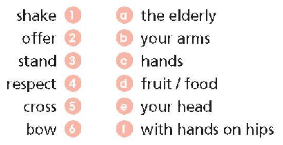Vocabulary: Customs - Unit 4. Culture & Ethnic groups - SBT Tiếng Anh 8 Right on!
1. Match the words to make phrases. 2. Choose the correct options. 3. Mark the sentences ✓ (Do) or ✘ (Don't). 4. Choose the correct prepositions. 5. Listen and put the words into the correct columns. Listen and check, then repeat.
Bài 1
1. Match the words to make phrases.
(Nối các từ để tạo thành cụm từ.)

Lời giải chi tiết:

1 – c. shake hands (bắt tay)
2 – d. offer fruit/food (tặng trái cây / thực phẩm)
3 – f. stand with hands on hips (đứng chống hông)
4 – a. respect the elderly (tôn trọng người lớn tuổi)
5 – b. cross your arms (khoanh tay lại)
6 – e. bow your head (cúi đầu)
Bài 2
2. Choose the correct options.
(Chọn các phương án đúng.)
1. If you go to a dinner party, you should offer/accept some flowers to the host.
2. Giving and receiving/respecting gifts is an important custom in many countries.
3. You should reuse/respect the customs of the local people.
4. It's polite/impolite to stand with your hands on your hips in Việt Nam.
5. In Japan, people greet/invite each other by bowing their heads.
Lời giải chi tiết:

1. If you go to a dinner party, you should offer some flowers to the host.
(Nếu đi dự tiệc tối, bạn nên tặng chủ nhà vài bông hoa.)
2. Giving and receiving gifts is an important custom in many countries.
(Tặng và nhận quà là một phong tục quan trọng ở nhiều quốc gia.)
3. You should respect the customs of the local people.
(Bạn nên tôn trọng phong tục của người dân địa phương.)
4. It's impolite to stand with your hands on your hips in Việt Nam.
(Đứng chống nạnh ở Việt Nam là bất lịch sự.)
5. In Japan, people greet each other by bowing their heads.
(Ở Nhật Bản, mọi người chào nhau bằng cách cúi đầu.)
Bài 3
3. Mark the sentences ✓ (Do) or ✘ (Don't).
(Đánh dấu các câu ✓ (Làm) hoặc ✘ (Không làm).)
DO'S & DON'TS in Việt Nam
1. ___ Greet people by shaking hands or bowing your head slightly with a smile.
2. ___ Start eating before the oldest person.
3. ___ Place your chopsticks standing straight up in your bowl.
4. ___ Offer a gift if someone invites you to their home.
5. ___ Accept a gift if someone offers you one.
Lời giải chi tiết:
DO'S & DON'TS in Việt Nam
(NÊN & KHÔNG NÊN ở Việt Nam)
1. ✓ Greet people by shaking hands or bowing your head slightly with a smile.
(Chào mọi người bằng cách bắt tay hoặc hơi cúi đầu và mỉm cười.)
2. ✘ Start eating before the oldest person.
(Bắt đầu ăn trước người lớn tuổi nhất.)
3. ✘ Place your chopsticks standing straight up in your bowl.
(Đặt đũa thẳng đứng trong bát của bạn.)
4. ✓ Offer a gift if someone invites you to their home.
(Tặng quà nếu ai đó mời bạn đến nhà họ.)
5. ✓ Accept a gift if someone offers you one.
(Nhận một món quà nếu ai đó tặng bạn một món quà.)
Bài 4
4. Choose the correct prepositions.
(Chọn giới từ đúng.)
1. My grandpa was the oldest person to/at the table.
2. I always greet people by/for shaking hands to be polite.
3. We never place our chopsticks standing straight up in/on our bowls.
4. Tom didn't know the local customs, so he didn't offer a gift to/from his host at the dinner last night.
5. Mr and Mrs Nguyễn invited me to/at their home.
Lời giải chi tiết:

1. My grandpa was the oldest person at the table.
(Ông tôi là người lớn tuổi nhất trong bàn.)
2. I always greet people by shaking hands to be polite.
(Tôi luôn chào mọi người bằng cách bắt tay để tỏ ra lịch sự.)
3. We never place our chopsticks standing straight up in our bowls.
(Chúng tôi không bao giờ đặt đũa thẳng đứng trong bát của mình.)
4. Tom didn't know the local customs, so he didn't offer a gift to his host at the dinner last night.
(Tom không biết phong tục địa phương nên anh ấy đã không tặng quà cho chủ nhà trong bữa tối hôm qua.)
5. Mr and Mrs Nguyễn invited me to their home.
(Ông bà Nguyễn mời tôi đến nhà họ.)
Bài 5
5. Listen and put the words into the correct columns. Listen and check, then repeat.
(Nghe và đặt các từ vào đúng cột. Nghe và kiểm tra, sau đó lặp lại.)
wa sh
s ome
re s ult
fa c e
fi sh
sh op
de s igner
s inger
alway s

Phương pháp giải:
- wa sh /wɒʃ/
- s ome /sʌm/
- re s ult /rɪˈzʌlt/
- fa c e /feɪs/
- fi sh /fɪʃ/
- sh op /ʃɒp/
- de s igner /dɪˈzaɪ.nər/
- s inger /ˈsɪŋ.ər/
- alway s /ˈɔːl.weɪz/
Lời giải chi tiết:
